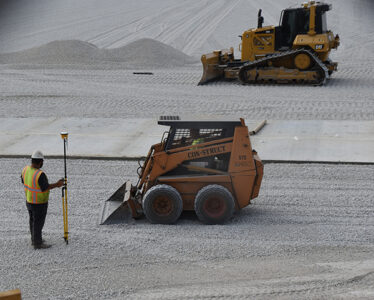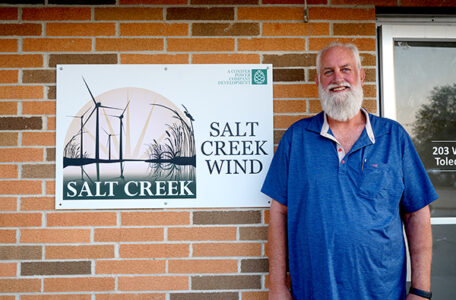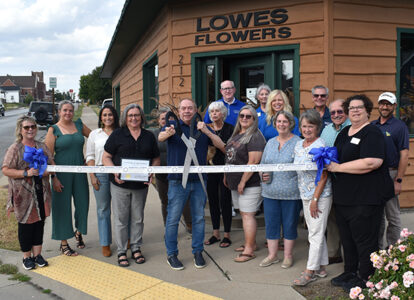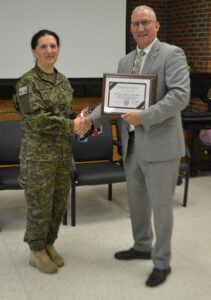LaVille endured firefights in Vietnam

T-R PHOTO BY CHUCK FRIEND Vietnam veteran Tom LaVille of Marshalltown stands next to some of his medals and awards received while in the military service in the 1960s.
Editor’s note: This is the latest in an ongoing series of articles profiling those who have ever served in the U.S. military, be it overseas or stateside. Every Thursday, a new profile will be published in the T-R.
Back in the 1960s, Marshalltown veteran Tom LaVille was a graduate of Scott College and was teaching at Brit High School when the draft board called.
“That was November of 1968, and I went to my principal and asked what to do as I had been drafted,” LaVille said. “He said he would take care of it and went to the school board who agreed it would be a hardship for the school and got me a deferment.”
In February he was drafted again with the same ritual taking place and another deferment being granted. Between March and May it happened three more times.
“When the sixth letter came in June, school was out and I had to go,” he remarked.
LaVille took his basic training and Advanced Infantry Training at Fort Polk, La., and then trained to be an Army Personnel Carrier driver at Fort Knox, Ky. After a 10-day leave, LaVille shipped out for Vietnam on Dec. 16, 1969.
“I was supposed to be an APC driver, but all the time in the service I never even saw an APC, let alone drive one,” LaVille laughed. “I became a machine gunner and walked most of the time we were there.”
As a member of Delta Company, 1st Battalion, 1st Infantry division, LaVille spent the first two days in Vietnam on guard duty as the rest of the company was out on patrol.
“And on my first night of guard duty I got shot at,” LaVille said.
When the company returned to base they were assigned to a platoon that was to carry ammunition for a machine gun crew.
“We were called ‘search and destroy.’ The Army rangers would find trails and if they determined them to be fresh we moved in to set up and ambush and combat zone,” LaVille said. “We had some contact (at least 10 or more minutes of intense firefights) every day that I was there. The length of the firefights was determined by when the enemy was either killed or ran out of ammunition and just left.”
LaVille explained that they would get resupplied with food, water and ammunition regularly, but the Vietnamese would not and that is why they left if they were not killed first. He said his unit would stay in the field for 15 straight days and then take three days down — going to rear at the base camp for shaves, showers and a little rest before returning to the field.
“Most people do not realize the amount of things a soldier had to carry in Vietnam. Things like eight to 10 quarts of water, ammo, food for meals, batteries for radios and some had night scopes,” LaVille said. “This in 110-degree heat.”
Our of 200 people in his unit, LaVille at 25 years of age was the oldest member, except for the captain and 1st Sergeant. He said all went by nicknames and he regretted that because he was not able to stay in touch with any of the men, except for one that he met in Vietnam and stayed with until returning home. He said that this “friend and comrade’ writes every Christmas.
He said that people heard of the 1st Infantry pulling out, but that in fact most of the 1st Infantry was shipped to become part of the 25th Division, and only the generals came home. He became a computer operator in the 25th Division dealing with the morning reports for the unit. He got an early out and came home — just 18 months after going in — with no reserve commitments required.
LaVille is the holder of two bronze stars and two Distinguished Service medals.




